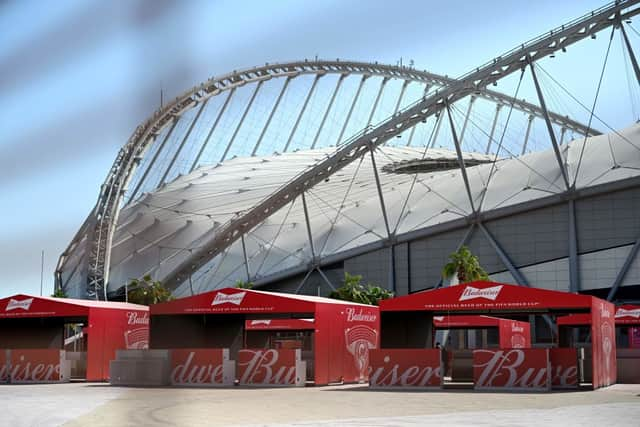Can you drink alcohol at Qatar World Cup stadiums? Hosts ban Budweiser beer from grounds at last minute
and live on Freeview channel 276
Qatar has overruled Fifa and banned alcohol at the eight stadiums hosting World Cup matches, just days before the tournament kicks off.
Fans will no longer be able to buy Budweiser, which would have been the only alcoholic drink available to fans due to its sponsorship of Fifa. The Times reported that the footballing governing body will be in breach of its £63million contract with the American beer company.
Advertisement
Hide AdAdvertisement
Hide AdNow no one attending matches - which kick off on Sunday when Qatar host Ecuador - will be able to consume alcohol within the stadium perimeter, with the exception of corporate spectators. Fifa released a statement today, 18 November, confirming the removal of beer bars from the stadium perimeters “following discussions between the host country authorities and FIFA”.
It is understood Qatar, as hosts, are concerned about the impact of alcohol sales on fans for whom drinking is not part of the culture – not just Qataris but people from other parts of the Middle East and Asia more widely.


Supporters will still be able to consume alcohol in designated fan zones, but the incident throws into question the degree to which FIFA has control over the tournament. Fifa had already made one concession earlier this weeek, by making the bars less visible.
The official guide world cup quide, published on Fifa’s website, had said: “Alcohol will be available to purchase for fans who wish to enjoy it. Where the Fifa World Cup stadiums are concerned, ticket holders will have access to Budweiser, Budweiser Zero, and Coca-Cola products within the stadium perimeter at the Brand Activation Areas three hours prior to kick-off when the gates open and one hour after the final whistle. For the opening and final matches, gates open four hours prior to kick-off.”
Advertisement
Hide AdAdvertisement
Hide AdBudweiser has yet to officially comment on the ruling. The company tweeted from its main account on Friday: “Well, this is awkward” – a post which was then deleted.


The Football Supporters’ Association criticised the lateness of the decision and accused organisers of a “total lack of communication”.
“Some fans like a beer at a game and some don’t, but the real issue is the last minute U-turn which speaks to a wider problem – the total lack of communication and clarity from the organising committee towards supporters,” a spokesperson said.


“If they can change their minds on this at a moment’s notice, with no explanation, supporters will have understandable concerns about whether they will fulfil other promises relating to accommodation, transport or cultural issues.”
Advertisement
Hide AdAdvertisement
Hide AdThe Muslim country has strong laws against drinking, with only certain hotels able to sell alcohol. Bringing alcohol into the country is completely forbidden and only residents are reportedly allowed to purchase alcohol from specialist outlets for home consumption, so drinking away from official venues will be off-limit for fans.
Much has been documentated about the potential prices and availability of alcohol at the tournament, and it would now appear that, contrary to their earlier promises that prices would be around £5-£8, the Qatari state is set to prices of beer at potentially extortionate prices.
Fifa’s official beer supplier, Budweiser, is reportedly charging 50 Qatari Riyals, equivalent to £11.60, for a 500ml beer. Qatar’s 2022 organiser had initially indicated that the country’s strict laws and high alcohol prices would be relaxed for the four weeks football supporters would be in the state, but it appears these initial plans have since been discarded.
Comment Guidelines
National World encourages reader discussion on our stories. User feedback, insights and back-and-forth exchanges add a rich layer of context to reporting. Please review our Community Guidelines before commenting.
